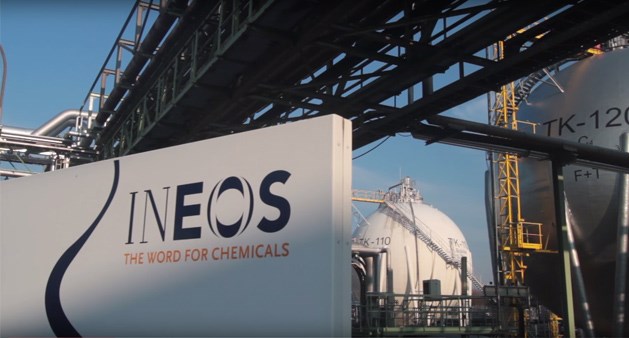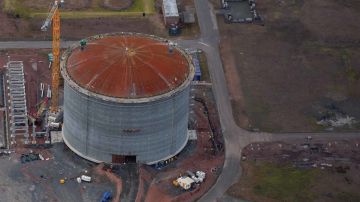The European Commission wants drastic cuts in energy consumption in Europe. It argues that it will be good for the environment, for jobs, energy security and the economy. INEOS, which spends 1.3 billion euros on energy every year, begs to differ.
THE European Commission is being urged to understand the significant day to day focus that the chemical industry has on improving its energy efficiency instead of imposing yet more targets. It is appealing to the Commission, which wants a 27% reduction in energy consumption by 2030, to see that saving energy is already a fundamental part of how INEOS operates.
“We don’t need more regulations or targets,” said Tom Crotty, INEOS Group Communications Director. “Energy efficiency is already a core business value because it makes good business sense. And nearly every technology available and affordable to reduce energy consumption has already been installed at our sites. To us a further cut in energy consumption would mean a cut in production.”
The Commission believes setting an ambitious energy efficiency target will be good for the environment, for jobs, energy security and the European economy.
INEOS, which spends 1.3 billion euros on energy every year, says the target is unrealistic, unworkable for the chemical industry and threatens to kill the industry in Europe and, with it, six million jobs.
INEOS believes the problem partly stems from the Commission’s lack of understanding about the importance and on-site reality of the chemical industry.
“We already have a competitiveness problem in Europe,” said Tom.
In a concerted effort to be heard amongst many people who responded to a European Commission consultation on its 2030 climate and energy policies, INEOS and CEFIC invited representatives from the Commission’s Directorate-General for Energy to visit the Köln site.
“INEOS has been working with great success on energy savings for years,” said Gerd Franken, CEO INEOS O&P North. “And we believe our sites are amongst the most energy efficient in the world.”
The Köln site in Germany employs 2,000 people from 28 nations, and covers an area the size of Monaco. It spends 90% of its expenses on energy and feedstock and uses enough to heat, light and power 200,000 homes.
The site might use a lot of energy but that does not mean it is inefficient. Stefan Krämer, energy manager at the site, showed the DG Energy delegation how everyone on the site already worked together to save energy.
“It is quite a challenge as internal energy networks at the INEOS site in Köln need to be balanced,” he said. “The nitric acid and acrylonitrile process, for instance, generates steam, and crackers and butadiene production need heat and therefore use steam.”
By-product hydrogen, rather than being flared, is used thermally in the power plant instead of natural gas – a move that has saved 80,000 MWh a year of natural gas. And improvements to the cooling tower have saved a further 13,000 MWh a year of electricity.
“INEOS really is determined to use and reuse everything it produces,” said Gerd, “It makes clear business and environmental sense.”
During the visit, Brigitta Huckestein, Communications and Government Relations from BASF, the world’s largest chemical company, also appealed to the Commission to see sense.
For the first-time ever BASF has announced a strategic cutback in European investment, citing stagnant markets, expensive energy and expensive labour.
Brigitta said BASF was struggling to find any further measures to reduce its energy consumption and C02 emissions.
The Ludwigshafen site of BASF is the biggest and most efficient, integrated site in Germany. But she argued that the integrated production would lose efficiency if a renewable energy surcharge was applied to selfproduced power from a CHP plant after 2017.
“It will also reduce the competitiveness of this most energy-efficient installation,” she said. “In short, we already feel driven out. If regulations stipulate the production of basic chemicals in Europe as a measure to reduce European energy demand, we feel it will be dangerous for the German and European economy because value chains will be destroyed. And if conditions are not favourable, we will invest elsewhere.”
Alistair Steel, a representative from CEFIC, which is the voice of the chemical industry in Europe, said affordable energy was the key to growth.
“The competitiveness depends on the industry’s access to competitive, reliable energy supplies,” he said.
The cost of producing ethylene in Europe is now twice as high as in the US where cheap shale gas has led to a manufacturing renaissance. And while INEOS’ profits in Europe have halved in the past three years, its profits in the USA have tripled.
“We can only cut so much energy,” said Greet van eetvelde, Manager of Cleantech Initiatives and based at INEOS’ head office in rolle, Switzerland.
“The European Commission has to decide whether it wants a chemical industry in Europe. It is impossible to meet these targets without significant investment and the economic climate in Europe makes this difficult.” even if INEOS wanted to fund clean technology, it faces an uphill battle.
“Banks like safe bets,” said Tom. “They do not like new technologies. Often the funding of new technologies is also dependent on support by the government which includes a political risk.”
Stefan said the chemical industry had been working on ways to make their production plants more efficient for years.
“The self-commitment of the industry to energy efficiency started long before EU directives in 1996,” he said.
Last year INEOS chairman Jim ratcliffe warned that Europe’s chemical industry was facing extinction within a decade.
“I can see green taxes. I can see manufacturing being driven away,” he wrote in an open letter to Jose Manuel Barroso, then president of the European Commission.
He urged the Commission to wake up.
“Worldwide the chemical sector has revenues of $4.3 trillion,” he said. “That’s bigger than the GDP of Germany. In Europe, chemicals and autos share top billing with $1 trillion each. Economically speaking chemicals is one of Europe’s jewels in the crown.”
INEOS is hopeful that the Köln visit may have opened eyes in Brussels.
Paul Hodson, a member of the Commission delegation, said in an email to INEOS that it had given them a valuable insight into – and understanding of – the chemical industry.
He said a thriving European industry was at the core of the Commission’s concerns and that its policies would seek to increase the industry’s competitiveness.
What the European Commission wants by 2030
- 27% reduction in energy consumption (non-binding for industry)
- At least 27% increase in renewables
- 40% cut in carbon emissions

















